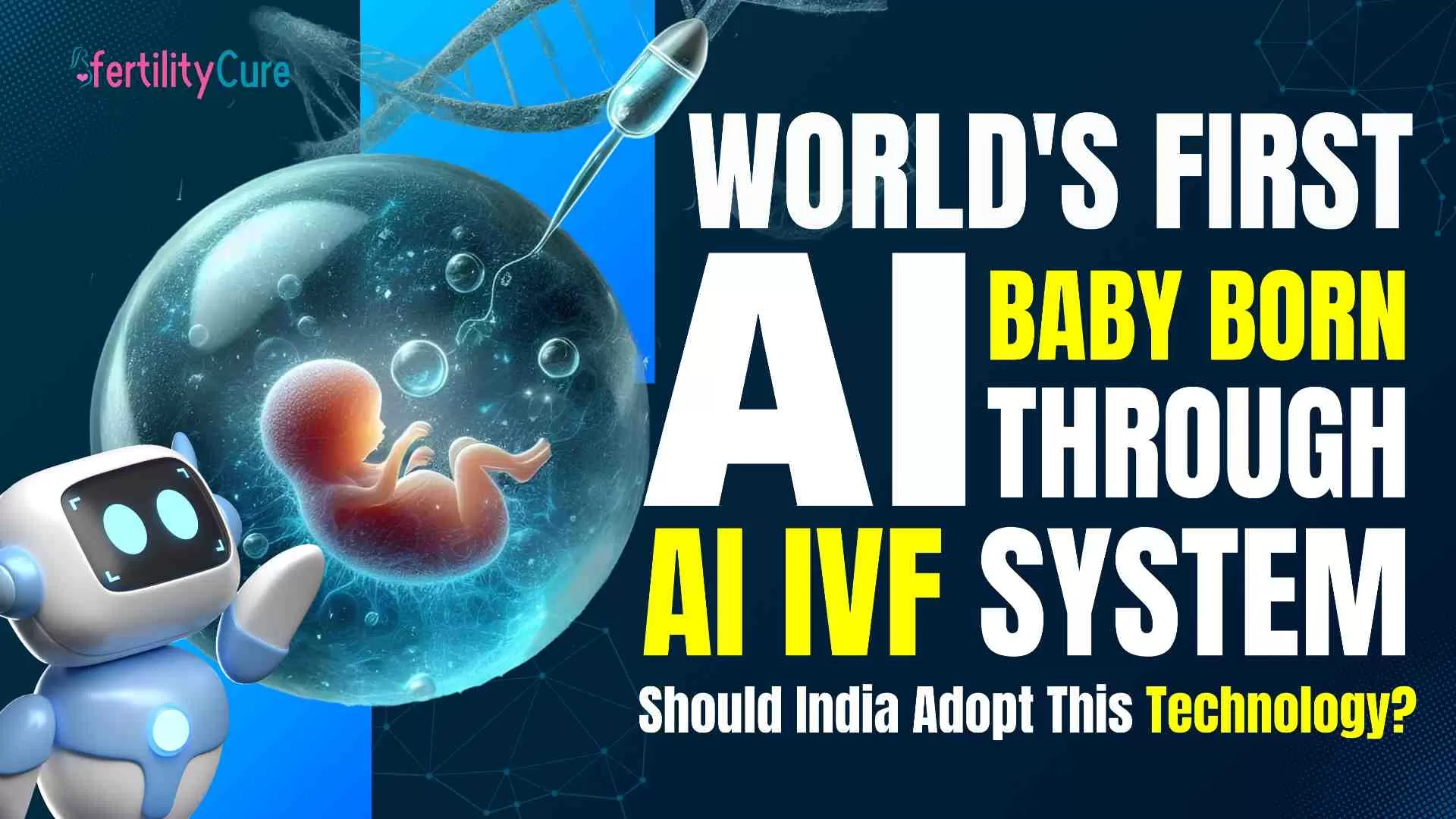World's First Baby Born Through AI IVF System: Should India Adopt This Technology?
by:Fertility Cure Centre
|
onApril 14, 2025
In:World
|
TypeResearch and Innovations

Have you ever imagined a world where a robot helps create life? A world where artificial intelligence in IVF becomes the bridge between dreams and parenthood? That world is no longer science fiction—it is now a reality. In April 2025, the first baby conceived using a fully automated AI IVF system was born in Mexico. This revolutionary event is not just a milestone in medical technology in fertility but a potential game-changer for fertility treatment worldwide—including in India.
What Is AI-Based IVF, and How Does It Work?
Conceivable Life Sciences developed the fully automated AI IVF system used in Mexico. It involves ICSIA (Intracytoplasmic Sperm Injection Automation), a process where an AI algorithm selects the best sperm and egg, and a robotic arm delicately injects sperm into the egg. This procedure is traditionally done manually by experienced embryologists, but precision robotics and AI in fertility treatment now handle it end to end.
Source: Business Today | Times of India | Hypefresh
Why Is This Breakthrough Important for IVF Success?
- Higher Precision: This AI in embryo selection reduces human error and makes more consistent, data-backed decisions about selecting healthy embryos.
- Standardization: Automated IVF procedures ensure the same quality of treatment regardless of the clinic's location.
- Accessibility: With less dependency on manual expertise, smaller clinics in remote areas could offer advanced IVF technologies in India.
Will AI IVF Disrupt the IVF Industry or Help It Grow?
The role of an embryologist is critical in traditional IVF. Understandably, many wonder: Will AI replace embryologists? The truth is that AI in embryology will not replace but assist. With this technology, embryologists won't have to do the same things repeatedly so that they can focus more on the complex parts of patient care. Moreover, AI could help clinics handle more cases with improved success rates, increasing growth in the IVF industry rather than disrupting it.
What Is the Success Rate of AI IVF Compared to Traditional IVF?
The first AI IVF baby was born from 4 out of 5 successfully fertilized eggs, showing promising early results. While long-term studies are pending, experts estimate that AI-driven IVF systems could increase IVF success rates by 10–20%, especially when AI embryo grading and genetic screening are involved.
| Method |
Average Success Rate |
Human Error Risk |
Standardization |
Cost Trend |
| Traditional IVF |
55–65% |
High |
Varies |
High per cycle |
| AI-Assisted IVF |
65–75% (Projected) |
Low |
Consistent |
Lower over time |
| Read more: NIH Fertility Research. |
||||
Will AI IVF Raise or Reduce the Cost of IVF Treatment in India?
Initially, the cost may be higher due to AI IVF technology setup and licensing. However, as more clinics adopt it:
- The cost per IVF cycle could be reduced since IVF automation cuts labour costs.
- Patient volume can increase, helping clinics recover investments.
- Improved accuracy reduces repeat IVF cycles, which saves money for patients.
In the long run, AI IVF may lower the cost of IVF in India, making it more accessible.
Benefits of AI IVF Technology for Patients and Clinics
- Improved Sperm and Egg Selection: AI algorithms in IVF analyze thousands of parameters for optimal selection.
- Consistency Across Clinics: Uniform standards, regardless of human skill level.
- Faster Results: Automation speeds up fertilization steps.
- Data-Driven Decisions: Personalized embryo scoring improves IVF implantation chances.
Drawbacks and Ethical Concerns of AI in Fertility Treatment
- Lack of Human Intuition: Emotional and ethical nuances still require human judgment.
- Regulatory Challenges in India: Approval and safety oversight may delay adoption.
- Initial Cost Barrier: Smaller clinics might struggle to afford the setup for AI-driven IVF labs.
Why Should India Consider Adopting AI IVF Technology?
India sees over 2.5 lakh IVF cycles yearly, yet success rates vary widely. AI could help standardize outcomes and improve success in tier 2 and 3 fertility clinics. With rising infertility and increasing demand, AI IVF in India can do the following:
- Expand access to rural fertility care
- Enhance success for older or high-risk cases
- Ease pressure on overstretched embryology teams
Explore: WHO Infertility Fact Sheet
Future of AI in the IVF Industry: What's Coming Next?
- AI embryo selection and ranking tools
- Predictive analytics for ovarian stimulation
- Pre-implantation genetic diagnosis via AI
- Voice and chatbot-assisted fertility consultations
With India's potential in medical tourism and IT, this is the perfect time to explore AI-driven IVF treatment in India.
Merits and Demerits of AI IVF
- Merits:
- High Precision in IVF Procedures
- Reduced dependency on expert workforce
- Better IVF success rates globally
- Demerits:
- Expensive initial tech infrastructure
- May face resistance from traditional clinics
- Ethical and privacy concerns in data handling
Helpful Resources
- Contact Us: Fertility Cure Centre – Book an Appointment
- Related Post: How to Choose the Right IVF Clinic in Gurgaon
- Learn More: What is ICSI? (Intracytoplasmic Sperm Injection)
- Resolve: Explore Surrogacy and Fertility Support
- AI in Fertility Research: PubMed Fertility AI Studies
Final Thoughts: Should India Say Yes to AI IVF?
This historic birth through an AI IVF system marks the beginning of a new chapter in reproductive healthcare innovation. For a country like India, with growing demand and rich medical expertise, the question is not if but how fast we integrate this technology. From improving success rates to lowering costs and expanding access, AI IVF in India has the power to reshape fertility care. But its success will depend on thoughtful adoption—balancing innovation with ethics and empathy. Will India lead the way in AI-powered fertility care or wait to catch up? The future is already being born—we need to nurture it.


